Antibody data
- Antibody Data
- Antigen structure
- References [0]
- Comments [0]
- Validations
- Immunocytochemistry [2]
- Immunohistochemistry [6]
Submit
Validation data
Reference
Comment
Report error
- Product number
- PA5-83826 - Provider product page

- Provider
- Invitrogen Antibodies
- Product name
- EVI1 Polyclonal Antibody
- Antibody type
- Polyclonal
- Antigen
- Recombinant protein fragment
- Description
- Immunogen sequence: ATSSPHSELE STGAILDDKE DAYFTEIRNF IGNSNHGSQS PRNVEERMNG SHFKDEKALV TSQNSDLLDD EEVEDEVLLD EEDEDNDITG KTGKEPVTSN LHEGNPEDDY EETSALEMSC KTSPVRYKEE EY
- Reactivity
- Human
- Host
- Rabbit
- Isotype
- IgG
- Vial size
- 100 μL
- Concentration
- 0.2 mg/mL
- Storage
- Store at 4°C short term. For long term storage, store at -20°C, avoiding freeze/thaw cycles.
No comments: Submit comment
Supportive validation
- Submitted by
- Invitrogen Antibodies (provider)
- Main image
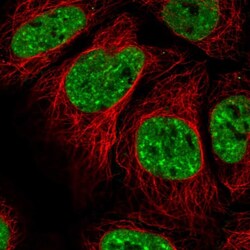
- Experimental details
- Immunofluorescent analysis of EVI1 in HEK 293 cells using a EVI1 polyclonal antibody (Product # PA5-83826). The analysis shows localization to nuclear speckles.
- Submitted by
- Invitrogen Antibodies (provider)
- Main image
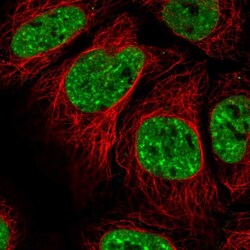
- Experimental details
- Immunofluorecent analysis of EVI1 in human cell line HEK 293 using EVI1 Polyclonal Antibody (Product # PA5-83826). Staining shows localization to nuclear speckles.
Supportive validation
- Submitted by
- Invitrogen Antibodies (provider)
- Main image
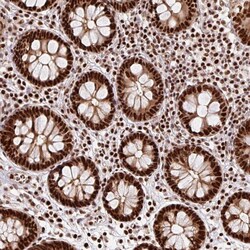
- Experimental details
- Immunohistochemical analysis of EVI1 in human colon using EVI1 Polyclonal Antibody (Product # PA5-83826) shows strong nuclear positivity in glandular cells.
- Submitted by
- Invitrogen Antibodies (provider)
- Main image
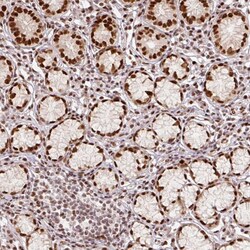
- Experimental details
- Immunohistochemical analysis of EVI1 in human stomach using EVI1 Polyclonal Antibody (Product # PA5-83826) shows strong nuclear positivity in glandular cells.
- Submitted by
- Invitrogen Antibodies (provider)
- Main image
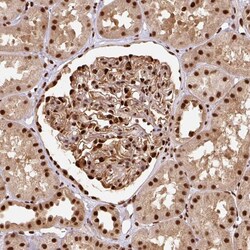
- Experimental details
- Immunohistochemical analysis of EVI1 in human kidney using EVI1 Polyclonal Antibody (Product # PA5-83826) shows strong nuclear positivity in cells in glomeruli.
- Submitted by
- Invitrogen Antibodies (provider)
- Main image
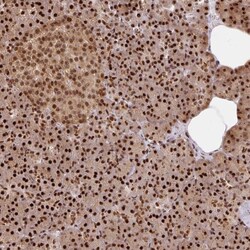
- Experimental details
- Immunohistochemical analysis of EVI1 in human pancreas using EVI1 Polyclonal Antibody (Product # PA5-83826) shows strong nuclear positivity in exocrine glandular cells.
- Submitted by
- Invitrogen Antibodies (provider)
- Main image
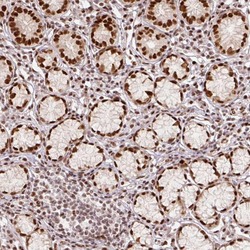
- Experimental details
- Immunohistochemical analysis of EVI1 in human stomach using EVI1 Polyclonal Antibody (Product # PA5-83826) shows strong nuclear positivity in glandular cells.
- Submitted by
- Invitrogen Antibodies (provider)
- Main image
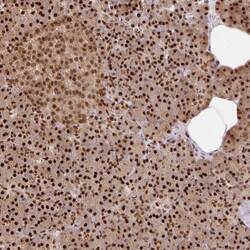
- Experimental details
- Immunohistochemical analysis of EVI1 in human pancreas using EVI1 Polyclonal Antibody (Product # PA5-83826) shows strong nuclear positivity in exocrine glandular cells.
 Explore
Explore Validate
Validate Learn
Learn Western blot
Western blot Immunocytochemistry
Immunocytochemistry